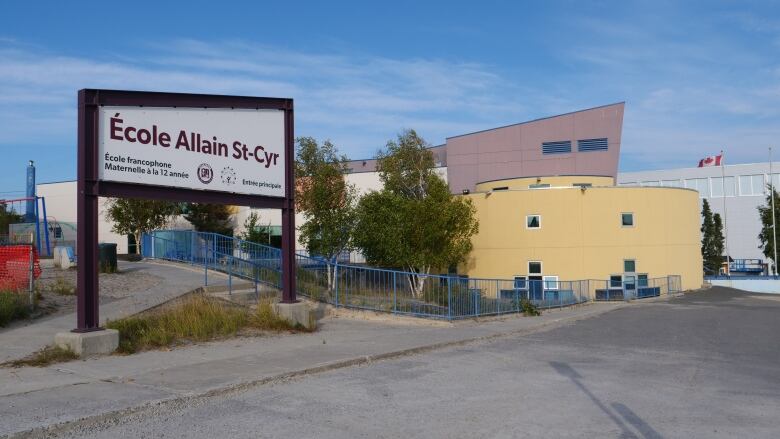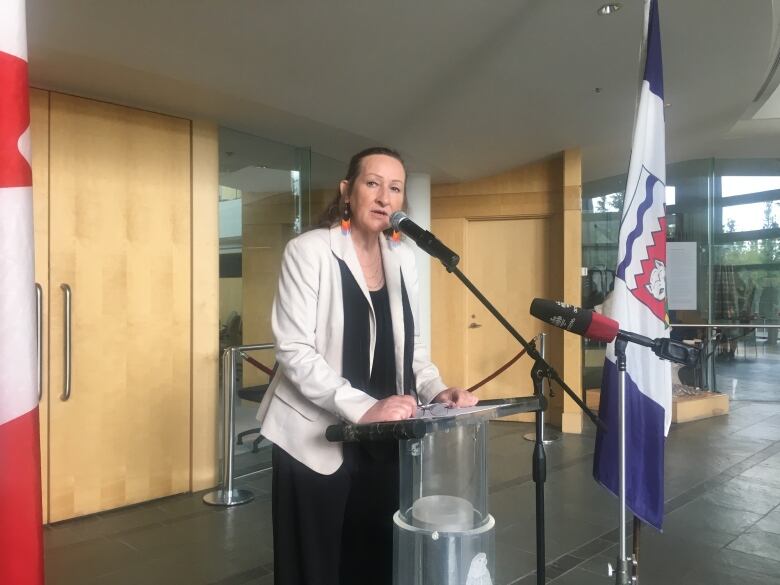N.W.T. education minister refuses 5 families access to French schools
4 affected families in Yellowknife; 1 in Hay River

Five N.W.T. families will not be allowed to send their children to French-language schools this week.
Northwest Territories Education MinisterCaroline Cochrane rejected the applications of these five non-rights holder families, four in Yellowknife and one in Hay River, late Friday afternoon just three days before the school year began.
A "rights holder" is somebody who has access to the constitutionally-protected right to a minority-languageeducation underSection 23 of the Canadian Charter of Rights and Freedoms.
The section's purpose is to ensure francophone families living outside of Quebec have access to French education andgives the same rights to English-speaking familieswhere they are the linguistic minority.
Earlier this summer, the Northwest Territories Supreme Court ordered the Minister to reconsider her refusal to admit one of these children, born in Canada from new immigrant parents, to cole Allain St-Cyr in Yellowknife in September 2018.
In his decision, Justice Paul Rouleau concluded Cochrane did not properly consider all of the factors in the use of her discretion powers, such as the development of the Francophone community.
The Northwest Territories government isappealing the case. In the meantime, the minister had agreed to reconsider her decision and also review four more similar cases that had also been denied in recent months.

Friday's new refusal was sent to parents and the school board that afternoon, three days before the start of the school year.
The decision is "extremely disappointing" according to Simon Cloutier, president of the Commission scolaire francophone, the territory's francophone school board.
"All I can say at the moment is that it is clear that there is a major problem with the minister of education, but also with senior officials who advise the minister of education," he said.
"It's hard to believe that in 2019 we're still fighting for things as simple as that."
In a news release Monday, Yvonne Careen, superintendent of the francophone board, said the board "deplores" the minister's approach to the situation.
The release says the board is discussing its options.
Francophone community 'not in jeopardy'
In an interview with CBC News,the assistant deputy minister at the Department of Education, John MacDonald, explained that a lot of work had been done to come to this new decision.
He says his department has reviewed all the factors that Justice Rouleau had noted, reviewing admission statistics for the territory's schools and the Francophone community'sdemography.
"At this stage, it became very clear that there is not a thing that is jeopardizing the strength or vitality, in terms of numbers, of the Francophone community and that under those circumstances it's not necessary to admit non-rights holders into a French-first language school," he said.
According to MacDonald, in order to comply with Section 23 of the Charter, the minister must ensure that admissions are not so restrictive as to be detrimental to the vitality of the schools and the Francophone community. But he adds that she must also offer a high quality French-first language program to preserve the language in the community.
That's the goal of a 2016ministerial directive on enrolment of students in French-first language education programs, according to the assistant deputy minister.
Some non-rights families were admitted under this directive and nowhave students enrolled at French-language schools in the N.W.T.
The French school board doesn't agree with the restrictions of the directive, and claims to be in a better position than the minister to rule over its own admissions.
The deputy minister says his department respects the contribution of the French school board, but adds that the education system is composed of different actors with different roles and different perspectives that sometimes look at issues in a different light.












_(720p).jpg)


 OFFICIAL HD MUSIC VIDEO.jpg)
.jpg)



























































































